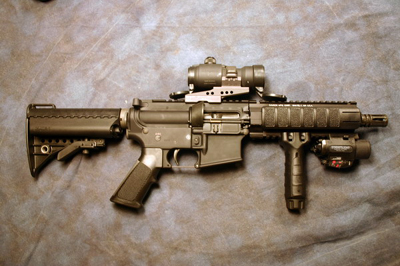The 9th Circuit ruled that Possession of an “Assault Weapon” Isn’t a “Crime of Violence”. But a few notes:
On the other hand, if we know that an object has no lawful uses, we can presume that someone who possesses it intentionally does so for the purpose of using it illicitly. And, if the universe of uses for such an object is largely confined to illegitimate violence, we can infer that the object will be used to intimidate or inflict physical injury during the course of an unlawful transaction. We have thus held that illegal possession of such a weapon — like a silencer or a sawed-off shotgun — is a crime of violence. What distinguishes silencers or sawed-off shotguns from other dangerous firearms isn’t the amount of injury they’re capable of inflicting — there are many weapons that can cause a lot more injury than a silencer. What makes silencers and sawed-off shotguns different from ordinary weapons is that they have few, if any, legitimate uses. Unlike an ordinary firearm, neither is likely to serve any sporting or self-defense purpose. Thus, we have held that they “are inherently dangerous, lack usefulness except for violent and criminal purposes and their possession involves the substantia risk of improper physical force.” We must determine, therefore, whether an assault weapon is more like an ordinary firearm, or more like a silencer or sawed-off shotgun.
Congress requires registration of any silencer, sawed-off shotgun or similar firearm. Failure to register a listed firearm is a crime punishable by up to ten years is prison. The registration requirement reflects Congress’s determination that certain weapons are almost certain to be used for unlawful purposes: “[T]he primary reason that unregistered possession of these particular weapons is a crime is the virtual inevitability that such possession will result in violence.” As the Seventh Circuit put it, “most firearms do not have to be registered — only those that Congress found to be inherently dangerous. If the weapon is not so labeled, mere possession by a felon is not a crime of violence.” Congress has never imposed a blanket registration requirement on semiautomatic weapons, suggesting that they have lawful uses and are less likely to lead to unlawful violence than sawed-off shotguns and silencers.
Suppressors and sawn-off shotguns serve many legitimate uses. Both are still legal to possess, at least at the federal level. Suppressors, for example, are used quite extensively in other countries as effective hearing protection and for varmint control in places where the crack of a gun shot may cause alarm. Additionally, sawn-off shotguns are quite effective home defense weapons. I find their argument unconvincing with respect to those two items.
More interesting, the ninth on the so-called assault weapons ban:
When Serna was convicted of possession of an assault weapon in 2002, possession of some semiautomatic weapons was a federal crime — but no longer. Thus, non-felons can now freely possess assault weapons under federal law. Even before the federal ban was allowed to lapse, it was riddled with exceptions: Congress exempted any firearm lawfully possessed under federal law before the passage of the act, and over 650 specific firearms. Thus, a large number of semiautomatic weapons remained legally in circulation, even during the so-called ban.
In the end, the temporary federal ban on assault weapons is largely a wash. The most plausible inference to be drawn from the evolution of federal law as to assault weapons is that Congress allowed the ban to lapse, having found it unnecessary. Because current federal policy places assault weapons on the same footing as other non-registrable weapons, we see this, on balance, as supporting Serna’s position. We find more significant the fact that, when the federal assault-weapon ban ended, Congress didn’t require previously-banned semiautomatic weapons to be registered. The fact that semiautomatic weapons are not now, nor have ever been, subject to a blanket registration requirement suggests that mere possession of them does not pose the same risk of physical injury as possession of weapons subject to a blanket federal registration requirement — like silencers and sawed-off shotguns.
Supposedly, the most liberal court in the land referred to the expired ban as a so-called ban. And implied it was thought to be unnecessary. Ouchie.




